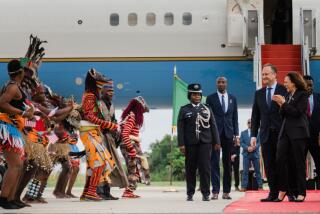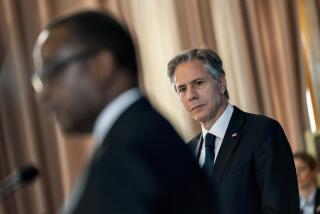Visiting Tanzania, Bush calls for renewal of AIDS program
DAR ES SALAAM, TANZANIA — With old and young providing testament to the success of a U.S.-funded effort to fight AIDS, President Bush on Sunday called for Congress to renew the program quickly and said that helping Africa was in the national and moral interests of the United States.
The program provides readier access to antiretroviral drugs, easing the impact of the disease. But it also puts a strong focus on premarital sexual abstinence, drawing criticism in the U.S. from the Institute of Medicine and the Government Accountability Office, which have said that this reliance limits the program’s reach.
Bush, however, said that Congress should “see what works.”
“It is a balanced program. It is an ABC program: abstinence, be faithful, and condoms. It’s a program that’s been proven effective,” he said, speaking at a news conference with Tanzanian President Jakaya Kikwete, an enthusiastic supporter of the effort.
“I understand there’s voices on both ends of the political spectrum trying to alter the program,” Bush said.
“I would ask Congress to listen to leaders on the continent of Africa . . . analyze what works, stop the squabbling and get the program reauthorized,” he said.
With the five-year authorization for the President’s Emergency Fund for AIDS Relief, known as Pepfar, coming to an end this year, Bush has asked that the funding be increased from the $18 billion spent so far to $30 billion for the next five years.
The administration had hoped Congress would renew the program by the end of 2007 as a sign of support and continuity. Its eventual renewal is not in doubt.
The president’s wife, Laura, speaking with a small group of reporters here, responded to critics who say $50 billion is needed by saying that the countries benefiting from the program did not have the capacity to absorb that much money efficiently and that “for budget reasons, it should stay at $30 billion.”
Bush and Kikwete visited a hospital, meeting with staffers and with two people whose health was restored by antiretroviral drugs, Honorati Valeri Shirima, 77, and Steven Rogers, 31. The Bush visit turned a presidential spotlight on what is widely seen as one of Africa’s success stories: the increase in testing for HIV/AIDS and the increasing availability of drugs, even as the demands on such programs continue to grow.
Bush is in the midst of a six-day, five-country trip across Africa’s midsection, intended to highlight the fight against AIDS and malaria, and to encourage political and tribal reconciliation and economic progress.
“It’s in our national interest that America help deal with hopelessness, and it’s in our moral interest that we help brothers and sisters that hurt,” Bush said.
But he has been criticized for not putting a similar effort into tackling the postelection political turmoil in Kenya and violent conflicts in Sudan and Chad, three nations not on his tour.
With his visiting counterpart at his side, Kikwete said that although “different people may have different views about you and your administration,” Bush’s legacy would include “saving hundreds of thousands of mothers’ and children’s lives from malaria” and preventing HIV infections.
Bush, responding to a reporter’s question about why it had taken him seven years to get to Tanzania, said: “I don’t have many excuses, except I’ve been a pretty busy guy.”
Laura Bush said later that she and the president would return after he leaves office -- because, she said, he had promised their daughters he would take them on a safari.
--
More to Read
Sign up for Essential California
The most important California stories and recommendations in your inbox every morning.
You may occasionally receive promotional content from the Los Angeles Times.










